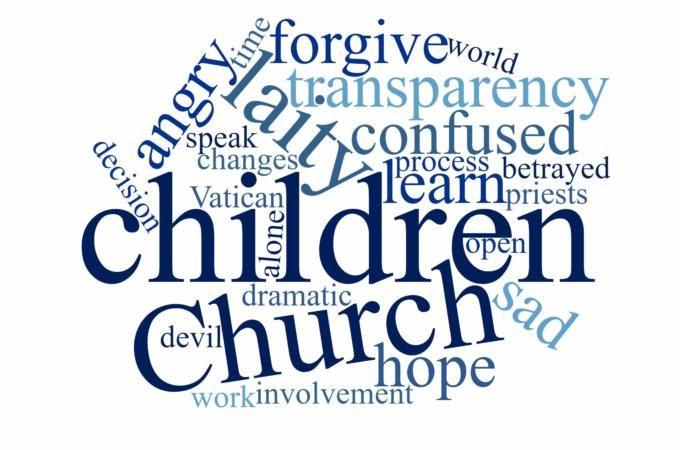How Catholics see the scandal
What do serious, practicing Catholics think about the sex abuse crisis? To find out, you can commission a public opinion survey or you can attend a parish listening session. I chose the latter approach, and the results were at least as illuminating as any opinion poll and possibly more so.
What I found out was that serious, practicing Catholics--those people in the pews who are the backbone of the Church -- are definitely angry, but they haven't lost their faith in the Church or their affection and respect for their priests. They want answers to how all this happened and they don't want airy reassurances that all is well. But they're willing to listen if the leaders of the Church will just give them straight talk.
Herewith a few verbatim notes on what I heard.
"...angry, sad, confused..."
"We feel lost. We looked to the priests and religious to tell us what our religion was all about. How do we stay faithful to our faith?"
"Our major concern is our children and grandchildren...How would you evangelize now?"
"Our own good priests have been betrayed."
"This happens outside the Church in society....We're not alone."
"The devil is in our world at work."
"...a need for much greater transparency."
"...a feeling of joy that this is all out in the open....There must be dramatic changes in the Church."
"It's time for the laity to wake up and speak out."
"...more lay involvement in the decision making process all the way up to the Vatican."
"We must learn to forgive."
There were no big surprises here nor were any magic solutions offered. People suggested what you'd them to suggest: more accountability, a bigger role for the laity in general and women in particular, maybe married priests.
Most striking perhaps in what I heard was the absence of bitterness. People are indeed deeply distressed about what has happened, but they aren't in a rush to blame anybody for it--not yet at least.
Commendable as it is, however, this patience is not inexhaustible, and I would not advise anyone occupying a leadership position in the Church to count on things staying that way without early and effective action to address the roots of the present crisis.
I was also struck by the fact that so many people appear to suffer from dismaying gaps in what they know about the sex abuse scandal. During the listening session I attended, the sentiment was frequently expressed that the bishops ought to be "doing more."
Very likely the bishops should be doing more, and perhaps they soon will be (their November general meeting will be crucial). But the people making this point often seemed unaware that the American bishops have been doing quite a lot about the sex abuse problem for the last 35 years, and apparently with good results as measured by the notable decline in new cases of abuse of minors reported in this time.
Here I mainly fault the media--especially the secular media--for feeding audiences a diet of sensational news while downplaying or ignoring the fact that sex abuse in Catholic institutions in the United States is way, way down. Is it possible that this partly reflects a certain deep-seated dislike of the Church arising from prejudices that have little or nothing to do with its record on sex abuse?
All in all there is cause for much encouragement in hearing serious, practicing Catholics speak out about this scandal. But note that I said encouragement, not complacency.
- Russell Shaw is the author of more than twenty books. He is a consultor of the Pontifical Council for Social Communications and served as communications director for the U.S. Bishops.



















